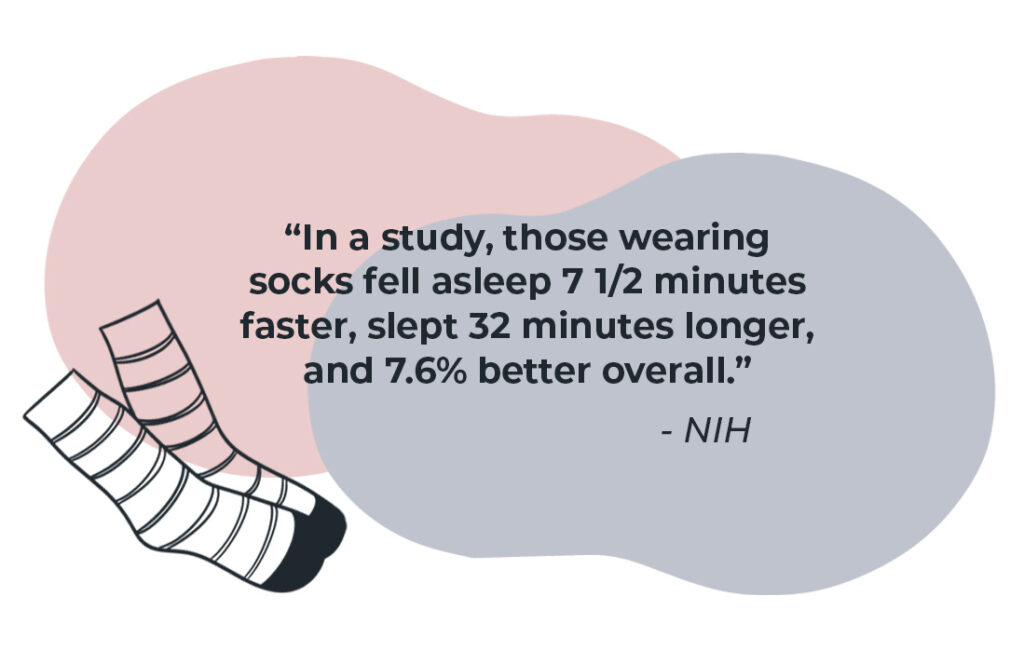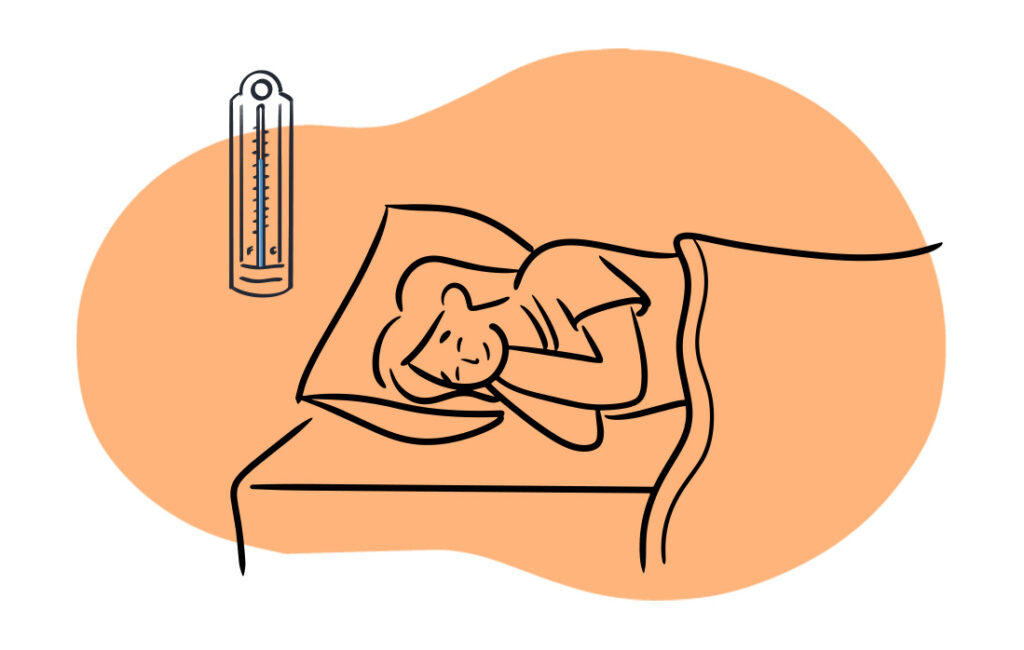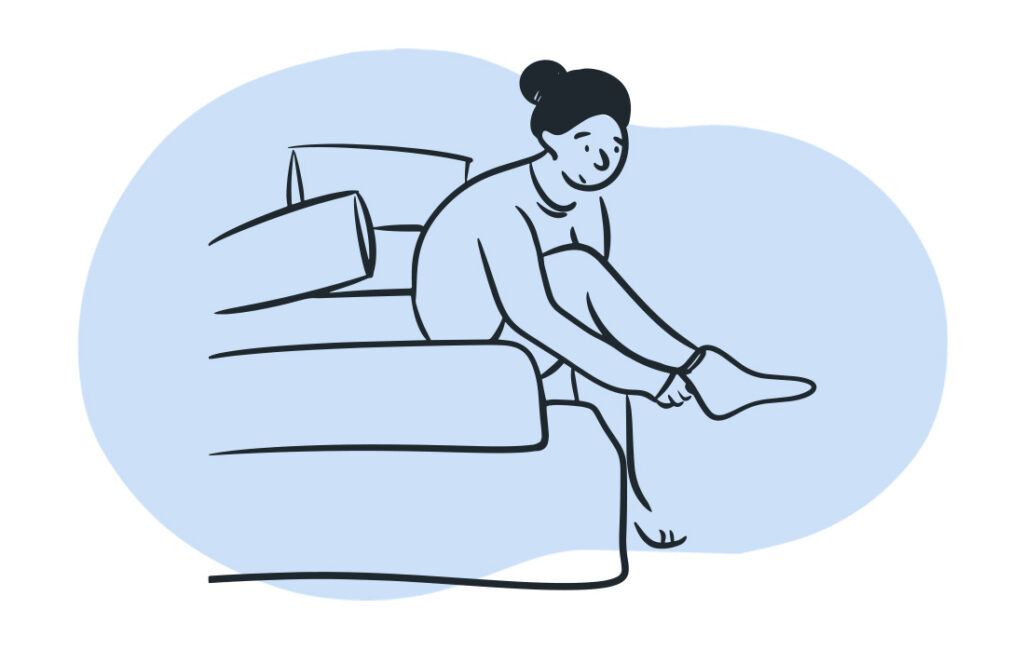Sleeping With Socks: Should You Wear Socks to Bed?
Disclosure: By clicking on the product links in this article, Mattress Nerd may receive a commission fee at no cost to you, the reader. Read full disclosure statement.
Wearing socks in bed is a pretty controversial topic. Those who love to wrap up their little piggies at night swear by it as a necessary bedtime ritual. Those who don’t may find it just plain weird.
But what if there was actual science behind the benefits of sleeping with socks on? One study actually found that adults who wear socks to bed fell asleep faster than those who didn’t. When you consider that, along with the fact that most experts recommend a sleeping temperature of around 60 to 67 degrees, a case can be made for socks being a sound sleep strategy.
Why Should I Sleep With Socks On?
Whether or not you’re on Team Socks, there’s actually a long list of reasons why wearing socks to bed can be beneficial. From increasing your sleep latency (the amount of time it takes you to fall asleep) to warding off night sweats, socks have some serious sleep benefits.

Fall Asleep Faster
Feet and sleep are more connected than you think. One study found that simply wearing socks to bed decreased the amount of time it took healthy young males to fall asleep by a full seven and a half minutes. So if you’re someone who struggles with falling asleep quickly, donning a pair of socks before hitting the hay could be a helpful strategy.
Prevent Hot Flashes
It might seem counterintuitive, but wearing socks to bed may actually help prevent hot flashes. When your feet are cold, your brain gets the message that your whole body needs to warm up: cue the hot flash. But when your feet are nice and toasty, your core body temperature lowers, which minimizes any drastic internal temperature changes.
Chance of Better Orgasms
We all know the bedroom isn’t just for sleeping. Wearing socks during sex may actually increase your chances of a better climax. One study found that socks increased the likelihood that couples would achieve orgasm by a whopping 30 percent. This is likely due to the fact that orgasm intensity heavily depends on blood circulation—and warming your feet improves blood flow.
Reduced Symptoms of Raynaud’s Disease
Do your fingers and toes ever feel icy cold even when it’s not cold outside? You could be experiencing Raynaud’s disease, a condition that causes some areas of your body—usually your fingers, toes, and feet—to feel cold and numb in response to temperature or stress. Sleeping with socks could help reduce the symptoms of Raynaud’s by keeping your feet warmer.
Prevention of Cracked Feet
For many people, the winter months bring more than just a chance of snow and ice — they also bring painful, dry, cracked feet. When the air is cold and dry, it strips away the natural oils in your skin, leaving your feet feeling dry, itchy, and uncomfortable. Applying some lotion to your toes and then locking in the moisture with a pair of socks can help you wake up to softer, smoother feet.

What Temperature Is Best For Sleeping?
Some like their rooms and mattresses cooler—and some like it hot. When it comes to sleep, everyone has an ideal temperature for drifting off into dreamland. But it turns out there may be a magic number to shoot for after all.
Body Temperature and Sleep
Your body temperature naturally dips when you sleep to prepare you for rest. This temperature decrease signals to your body that it’s time to wind down and get some shut-eye. Having the thermostat set too hot or too cold can actually disrupt this natural dip and make it harder for you to fall asleep. That’s why experts recommend aiming for a sleeping temperature of 60 to 67 degrees Fahrenheit.
Wearing Socks to Bed
Not all of us have control over the temperature in our bedrooms. If you find yourself shivering in the middle of the night or if your feet tend to feel uncomfortably cold even when bundled up in blankets, throwing on a pair of socks may be the key to staying warm. And no matter what the temperature is, if you have trouble falling asleep, wearing socks could help accelerate sleep onset.
Sleep Hygiene
Does the idea of sleeping in socks totally make you cringe? You’re not alone—and socks aren’t the only answer to getting a good night’s sleep. If you think you need to warm up your body before you go to bed, try one of these other tactics:
- Take a warm bath or shower before climbing into bed
- Drink a cup of herbal tea before sleep (but avoid caffeine)
- Use a hot water bottle or heating pad
- Load up on blankets
In addition to keeping your feet warm, don’t forget to employ basic sleep hygiene tips as well. Go to bed at the same time every night (even on weekends), turn off electronics at least an hour before sleep, and create a dark, quiet, and cool environment in your bedroom. These simple changes can make a world of difference when it comes to your sleep quality.
Best Socks To Wear To Bed
Ready to throw on a pair of socks and get some sleep? Look for these specific kinds:
- Cashmere/Merino Wool: If you want to treat yourself, go for a pair of socks made with cashmere or Merino wool. These high-quality materials are not only very soft but they’ve also been shown to promote sleep quality as the small fibers allow for the expulsion of heat.
- Cotton: Cotton is a light, breathable material that will keep your feet feeling fresh all night long. It also allows for heat buildup and expulsion—but not the build-up of moisture.
- Bed Socks: Yep, there’s such a thing as bed socks. These socks are specifically designed to be worn in bed and usually have a loose, thick material that can wick moisture and prevent bacteria growth.

FAQs About Sleeping With Socks On
Is it bad to not sleep with socks?
No, sleeping with socks is a personal preference (though it does have benefits). Just make sure you’re creating a comfortable sleep environment by keeping your room between 60 and 67 degrees Fahrenheit.
Who shouldn’t wear socks to bed?
People who have circulatory issues or whose feet tend to swell should avoid sleeping with socks. Socks can actually cut off circulation and make swelling worse. If you have any concerns, please talk with your doctor.
Can socks help with sleep disorders?
More research is needed, but there is some anecdotal evidence that socks may help with sleep disorders like insomnia. If you live with a sleep disorder, talk with your doctor for advice.
What if I don’t like wearing socks?
You can also try other tactics to warm your feet before bed, like taking a bath or shower, drinking herbal tea, using a heating pad, or wearing cozy house slippers.
How to make your own rice socks
If you want to make your own rice socks, simply fill a sock with rice and microwave it for 30-60 seconds. Make sure the sock isn’t too hot before putting it on your feet. You can also add essential oils like lavender to promote relaxation.
Final Thoughts
As it turns out, sleeping with socks isn’t as weird as it sounds—and it might just be the thing you need to get a good night’s sleep. If you’re looking for a way to warm up your feet before bed, socks are a great option. Just make sure you choose the right material—like cotton or wool—to keep your feet comfortable and your sleep uninterrupted all night long.
Sources
Can Wearing Socks to Bed Help You Sleep Better? (2022) https://health.clevelandclinic.org/sleeping-with-socks-on/
Ko Y, et al. (2018). Effects of feet warming using bed socks on sleep quality and thermoregulatory responses in a cool environment. https://www.ncbi.nlm.nih.gov/pmc/articles/PMC5921564/
Raymann R, et al. (2007). Skin temperature and sleep-onset latency: Changes with age and insomnia. https://pubmed.ncbi.nlm.nih.gov/17070562/
Raynaud’s disease. (2020). https://www.mayoclinic.org/diseases-conditions/raynauds-disease/symptoms-causes/syc-20363571
Roberts M. (2005). Scan spots women faking orgasms. http://news.bbc.co.uk/2/hi/health/4111360.stm
Shin M, et al. (2016). The effects of fabric for sleepwear and bedding on sleep at ambient temperatures of 17°C and 22°C. https://www.ncbi.nlm.nih.gov/pmc/articles/PMC4853167/
Sleep Latency. (2022). https://www.sciencedirect.com/topics/nursing-and-health-professions/sleep-latency.
What’s the Best Temperature for Sleep? (2021). https://health.clevelandclinic.org/what-is-the-ideal-sleeping-temperature-for-my-bedroom